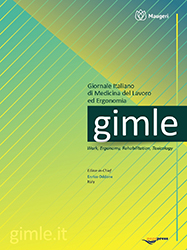QUALITY OF PROFESSIONAL LIFE OF WORKING WITH ASYLUM SEEKERS: COMPASSION SATISFACTION, BURNOUT AND SECONDARY TRAUMATIC STRESS IN RECEPTION PROFESSIONALS
All claims expressed in this article are solely those of the authors and do not necessarily represent those of their affiliated organizations, or those of the publisher, the editors and the reviewers. Any product that may be evaluated in this article or claim that may be made by its manufacturer is not guaranteed or endorsed by the publisher.
Authors
In the last years, in Italy, Extraordinary Reception Centres have been set up to meet the primary and secondary needs of asylum seekers landing on the Mediterranean coast. After the opening of the ERCs, a new professional body, the reception professionals, has been formed in the national territory.
According to the context and the goals of the ERC, at the beginning no specific training was required, so their professional profile derived from the different background. Considering their institutional task, such as facilitating the reception and the full care of asylum seekers, the reception professionals are daily involved in the relationship with the respondents and exposed to their traumatic stories or symptoms. In fact, asylum seekers are people who are often deeply traumatized by past experiences, by the journey, but also disoriented and unprepared for the complex experience of reception and integration, wich influence the climate and quality of professional life of reception professionals. As happen in helping professionals continuously exposed to stressful or traumatic events, also in the work of helping for and welcoming asylum seekers there is a high risk of developing the negative symptoms associated with Burnout and vicarious trauma.
Although, in the last twenty years, the quality of professional life has been extensively studied in several areas, there are no studies that explore this issue among professionals in the field of reception.
In this study, the questionnaire ProQOL 5 was submitted to the reception professionals of the Extraordinary Reception Centres of Parma and its province, actively involved in helping relationship with asylum seekers, with the aim of defining the state of psychosocial well-being and their quality of professional life. Although it has been shown that on average reception professionals report good satisfaction in carrying out their work, three profiles have emerged. The first group reports a higher level of Burnout, the second group a greater Compassion Satisfaction and the third group, instead, a higher level of Burnout and Secondary Traumatic Stress. The data obtained allow to partially fill a gap in the literature. Moreover, the results suggest the need of interventions of prevention and management of organizations, in order to promote the psychosocial well-being of this emerging professional body.
How to Cite

This work is licensed under a Creative Commons Attribution-NonCommercial 4.0 International License.
PAGEPress has chosen to apply the Creative Commons Attribution NonCommercial 4.0 International License (CC BY-NC 4.0) to all manuscripts to be published.






